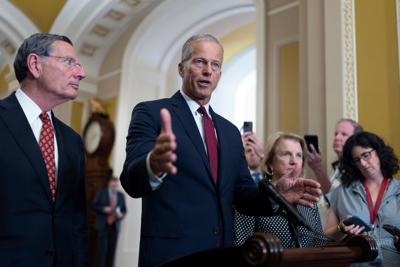WASHINGTON — It seems likely that Kurt Wall will be confirmed as U.S. Attorney for the Baton Rouge region — eventually.
The U.S. Senate Judiciary Committee on Thursday voted again to recommend that the full chamber confirm Wall's nomination by President Donald Trump. The committee had done so the week before, but only after the panel’s Democrats stormed out of the meeting, bickering over another candidate and later questioning the absence of a quorum.
Judiciary Chair Chuck Grassley, R-Iowa, ran a second vote and Wall was again added to the list of about 300 nominees of President Donald Trump awaiting confirmation under the Senate’s advise and consent role.
The second vote bodes well for Wall’s eventual confirmation, said Carl Tobias, a University of Richmond law professor who tracks federal judicial appointments.
“Nobody said anything negative about him," Tobias said. "Nobody talked about him at all.”
Nevertheless, Wall is collateral damage in a partisan fight that prompted Trump to demand the Senate forego its summer vacation and confirm his nominees.
Wall is now one of three Louisiana nominees waiting for Democratic and Republican senators to reach agreement, as they usually do, to more efficiently confirm.
Two New Orleanians, Peter Thomson, who is up for CIA inspector general, and James Baehr, chosen as the next general counsel at the Department of Veterans Affairs, sit on the Senate’s calendar awaiting a confirmation vote. The other four Trump nominees with Louisiana roots are still going through committee vetting.
Senate Majority Leader John Thune, R-South Dakota, said he was “thinking about” keeping the Senate in Washington. Starting Monday at 8 p.m., the upper chamber will do little but vote on confirmations in hopes of clearing the pipeline enough that senators can go home on Friday as planned.
Citing problems with the quality of some nominations, the extreme ideologies of others, and smarting from GOP-only votes to slam through the spending bill and legislation to claw back already appropriated funds, Democrats are making their Republican colleagues go through time-consuming procedures that have slowed confirmation of federal judges, U.S. Attorneys, and other officials.
After the Senate adjourned Thursday night for the weekend, the chamber's GOP caucus noted that 107 Trump nominees had been confirmed — almost double the number ready to take their jobs at this point in 2017, six months into the president’s first term. This “despite unprecedented Democrat obstruction,” the online post stated.
The “obstruction” line was repeated by almost every GOP senator.
Senate Majority Whip John Barrasso, of Wyoming, said on the Senate floor: “Democrats are waging a coordinated campaign of obstruction.”
“President Trump is the first president to not have a single nominee passed by unanimous consent, which means you have to have a vote,” said Sen. Bill Cassidy, R-Baton Rouge. “It’s fair at this point to say that stalling techniques by the Democrats are hurting the abilities of getting appointees through.”
Democrats haven’t allowed unanimous voice votes, thereby requiring on-the-record tallies for each confirmation. But both parties have a history of interfering with the other's efforts to confirm nominees.
Back in 2018, Kentucky Sen. Mitch McConnell, then the majority leader, kept Democratic senators in Washington for two weeks during August to keep them from campaigning in November’s elections.
Then there is Vice President JD Vance, who, as a senator from Ohio, held up the confirmation of U.S. Attorneys. This go-around, Democratic senators are doing a little payback.
In every Senate, opposition to controversial candidates slows the pace.
This time, former Fox News host Jeanine Pirro, who is up for U.S. Attorney in the District of Columbia, and Emil Bove, who is line for a seat on the Third U.S. Circuit Court of Appeals, based in Philadelphia, have engendered considerable opposition. Democratic senators argue that Pirro is a prominent denier of the 2020 presidential election results, and Bove is a former lawyer for Trump who has said the administration should ignore court rulings it doesn’t like.
Other nominees are opposed by GOP senators.
Paul Ingrassia, for instance, is sailing against strong Republican headwinds in his confirmation to the Office of Special Council, which protects whistleblowers and enforces laws prohibiting political activity from federal employees. He has practiced little law but has associated with online extremists and made antisemitic comments.
A group of Republicans, led by Kentucky Sen. Rand Paul, oppose confirming Mike Waltz as ambassador to the United Nations. But he’ll likely be confirmed Monday because the State Department agreed to release $75 million in foreign aid for Haiti and Nigeria, which some Democrats sought.
“It's like the same thing that Republicans did to Biden for four years,” Tobias said.


